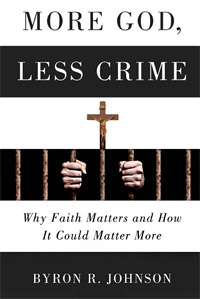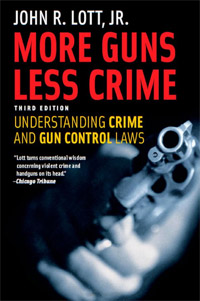More God, Less Crime or More Guns, Less Crime?
During the last week of 2011, I spoke at and attended a wonderful salon in Santa Fe, New Mexico organized and hosted by Sandy Blakeslee, the brilliant science writer for the New York Times and the author of numerous engaging popular books on neuroscience. Two of the speakers at the salon addressed the topic of the decline of crime, one (Byron Johnson) attributing it to god and the other (John Lott) to guns. Of the two, Lott by far took the day with superior data and better arguments, although for a much wider and deeper analysis of the decline of violence in general I highly recommend Steven Pinker’s The Better Angels of Our Nature: Why Violence Has Declined (Viking, 2011), which I recently reviewed in these pages.
Byron Johnson is a professor at Baylor University and the founding director of the Baylor Institute for Studies of Religion as well as director of the Program on Prosocial Behavior. Acknowledging that he took the title of his book, More God, Less Crime: Why Faith Matters and How It Could Matter More (Templeton Press, 2011) directly from Lott’s book, More Guns, Less Crime: Understanding Crime and Gun Control Laws (University of Chicago Press, 2010), Johnson mostly recounted his experiences working with prisoners in an attempt to lower recidivism rates by increasing religiosity…of the Christian variety, of course. What few data slides he presented harmed his case more than helped it by being either impossible to read (dark, small type) or countering his claim (one slide showed no difference in post-conversion crime rates). Even his anecdotes seemed to gainsay his thesis, as in recounting the story of one man who even after converting to Christianity refused to confess his crime of rape and murder of a young girl until he met her mother on the day of his execution, at which point he broke down and apologized to her. Additional anecdotes and frank admissions by Johnson only worsened his case, such as that many prisoners only convert in order to impress parole boards, and that many of his fellow Christians (he called them “high octane” evangelicals) were only in the game to tally up conversion scores in an environment ripe for the picking. (I routinely receive letters from prisoners who bemoan the constant evangelizing, not only by Christians but by Muslims as well who also see prisons as conversion opportunities. As the Russian comedian Yavak Smirnoff used to joke about performing in the USSR, mixing “captured” for “captive” audiences: “they’re not going anywhere!”)
Johnson seems like a nice enough fellow, and with our current overcrowded prison system letting criminals out early, if he really can lower recidivism rates it’s hard not to acknowledge that this is a good thing for society (assuming he’s having any effect at all, which I presume he must be at least on a case-by-case basis, even if it isn’t statistically significant from other recidivism methods). Although I would much prefer that people not commit crimes for rational and secular moral reasons (respect for private property, sanctity of life, etc.), I am reminded of an encounter I had with a young Christian man in his early 20s during the Q & A after one of my public lectures. I had just asked the rhetorical question—which I often ask during my talk on the evolution of morality and how to be good without god—“What would you do if there were no God? Would you rape, steal, and murder?” Naturally people agree that they wouldn’t, but in this instance the man said he was pretty sure that if he decided that there were no god he would do just that. I told him that Jesus loves him and has a plan for his life and future. It got a laugh but everyone in the room realized that not everyone is a rational calculator and moral reasoner. Some people may very well need the shadow of enforcement that comes from believing in an invisible policeman in the sky who, like those pesky red light video cameras at busy intersections, insures that even when the cops aren’t around all sins and violations will be settled in due time, even without due process.
As far as I know Johnson, along with his fellow religious believers who embrace the hypothesis that religion is good for society, have failed to account for a simple and obvious (once you think about it) correlation and comparison: Gregory Paul’s 2005 study published in the Journal of Religion and Society—“Cross-National Correlations of Quantifiable Societal Health with Popular Religiosity and Secularism in the Prosperous Democracies”—that showed an inverse correlation between religiosity (measured by belief in God, biblical literalism, and frequency of prayer and service attendance) and societal health (measured by rates of homicide, suicide, childhood mortality, life expectancy, sexually transmitted diseases, abortion, and teen pregnancy) in 18 developed democracies. “In general, higher rates of belief in and worship of a creator correlate with higher rates of homicide, juvenile and early adult mortality, STD infection rates, teen pregnancy, and abortion in the prosperous democracies,” Paul found. “The United States is almost always the most dysfunctional of the developed democracies, sometimes spectacularly so.” Indeed, the U.S. scores the highest in religiosity and the highest (by far) in homicides, STDs, abortions, and teen pregnancies.
If religion is such a powerful prophylactic against sin, immorality, and crime, then why is the most religious democracy on the planet also the most sinful and crime-ridden? I’m not claiming that religion causes these problems (although Paul does make this claim), only that the claim that it prevents or attenuates them is falsified by the data.
John Lott, by contrast, is a social scientists’ social scientist. A data man to the core, I spent several hours with him the night before at a party pressing him for details of his argument that more guns means less crime. He was unwavering in his conviction—both to me privately and in his public talk (and in his book)—that not one social scientist or criminologist has been able to produce a single example of a city or county that has experienced a consistent decline in crimes after a ban on guns was enacted. In fact, in slide after slide and example after example Lott showed that the opposite correlation tends to be the case: gun bans increase crime.
Take Washington, D.C. Before the ban on handguns was implemented in August of 1976, DC ranked 20th in murder rates out of the top 50 cities in America. After the gun ban, DC shot up to either #1 or #2, where year after year it held steady as “the murder capital of the nation,” as it as dubbed by the media. As a control experiment of sorts, after the Supreme Court decision in the Heller case overturned the DC gun ban, murder rates dropped and have continued to fall ever since. According to Lott, whose data is based primarily on crime statistics provided by the FBI, once the gun ban was lifted, homicide rates plummeted 42.1%, sexual assault rates dropped 14.9%, robbery excluding guns dropped 34.3%, robbery with guns plunged 58%, assault with a dangerous weapon excluding guns sank 11%, assault with a dangerous weapon using guns tumbled 35.6%, and total violent crime nosedived 31%, along with total property crimes decreasing a total of 10.7%.
Chicago showed a similar effect, Lott demonstrated. Ever since the gun ban was implemented in 1982, no year has been as low in crimes as it was before the ban. Island nations (which serve as good tests, Lott says, because their borders are more tightly controlled from extraneous variables) demonstrate the same effect: Jamaica and Ireland homicide rates increased after gun bans were imposed. Ditto England and Wales: After a gun ban was imposed in January of 1997, homicide rates slowly climbed and peaked at an average of 28% higher after the ban. (By dramatic contrast, Lott said that in 1900 London in which people were free to do whatever they wanted with their guns, there were a grand total of 2 gun-related deaths and 5 armed robberies in a population of many millions, and this was 20 years before gun laws began going into effect in 1920.)
Why do more guns mean less crime? Lott offers a very practical explanation: it is extremely hard to keep criminals from getting and keeping guns. In other words, Gun bans are primarily obeyed by non-criminals. Criminals that already have guns do not turn them in, and potential criminals that want to get guns have no problem procuring them on the street illegally. Lott cited several studies by criminologists who interviewed criminals in jail and collected data on the amount of time they spend casing a home before burglarizing it. In the U.K., where gun bans are much more prevalent than in the U.S., the criminals reported that they spend very little time casing a joint and that they don’t really care if someone is home or not because they know the residents won’t be armed (whereas they, of course, are armed). Their U.S. counterparts, by contrast, reported spending more than double the time casing a home before robbing it, explaining that they were waiting for the residents to leave. Why? They said that they were worried they would be shot.
Why is crime so much higher here in the U.S. than in the U.K. and elsewhere? Lott explained that the remarkably high homicide rates are a geographical anomaly. The U.S. justice department reports that about 80% of violent crimes are drug gang related, and that about 75% of homicides take place in 3% of counties. And even within those counties the murders are taking place in a tiny portion in which drug gangs are operating. So when we compare murder rates between countries—say between the U.S. and Canada—it is really comparing the crime in one country to just a very tiny portion of American cities where gangs proliferate. What would happen if drugs were legalized? Speaking as an economist who understands the basic law of supply and demand, Lott opined that there is no doubt that crimes would decrease while drug-use would increase. So it’s a trade-off.
I do not know this area well enough to judge the validity of Lott’s thesis. His data and his plausible causal explanations for the correlations strike me as sound, although I know that proponents of gun control have taken him to task over various statistical issues. Still, I would like to see his fundamental challenge met: is there any city or county in the U.S. where crime and murders have consistently decreased after gun control laws were passed and enforced?
Anecdotally, of course, we are horrified at the innocent people gunned down who would be alive were there no guns anywhere in the country. Just days before Lott’s lecture, in fact, there was the story about the U.S. soldier returning home from Iraq who was shot dead on Christmas day in a dispute over a football team. Had there not been guns in that home the worst thing that probably would have happened is a bit of pushing and shoving and shouting, perhaps a roundhouse punch or two thrown, and a couple of bruised egos in the end. But the problem is that the genie is out of the bottle. Millions of guns are already out there, and short of a Stasi-like police state sweep through every home, business, garage, shack, storage unit, cabin, car, and container in every nook and cranny in every state in the union, gun bans will most likely be honored by the people who least need them and ignored by those who do—the criminals.



